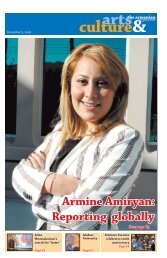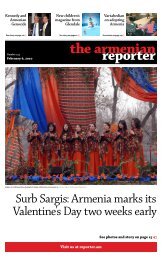Leading lady Karen Kondazian - Armenian Reporter
Leading lady Karen Kondazian - Armenian Reporter
Leading lady Karen Kondazian - Armenian Reporter
You also want an ePaper? Increase the reach of your titles
YUMPU automatically turns print PDFs into web optimized ePapers that Google loves.
<strong>Kondazian</strong><br />
on stage with<br />
Dominic Acosta,<br />
Lauren Silvi, and<br />
Lisa Pelikan.<br />
Photos: Ed Krieger.<br />
to foil his secretary’s attempts<br />
to keep him from overeating.<br />
“Poor thing,” <strong>Kondazian</strong> tells me.<br />
“They always had people around<br />
to watch him so he wouldn’t eat.<br />
So one day, he and I have a little<br />
scene. There’s all this food. In<br />
movie sets, unlike theater, it’s<br />
real food that you can eat. I saw<br />
him; his eyes were focused on<br />
this food. Finally he grabbed me<br />
and used me as a shield from the<br />
trailer where his secretary was<br />
lurking. He was moving me along,<br />
and behind me he would be grabbing<br />
food and stuffing food into<br />
his mouth, gobbling! Then he’d<br />
push me to the next dish and do<br />
the same thing. All of a sudden<br />
the secretary saw us. She came<br />
out screaming in Italian. She was<br />
screaming at me like it was my<br />
fault. He thought it was so funny.<br />
So from that moment on we<br />
became great pals. He kissed my<br />
hand a lot, but he never made a<br />
pass. So sweet and generous, and<br />
I’m so sorry he’s gone. That beautiful<br />
voice.”<br />
Channeling Maria Callas<br />
Many people now recognize <strong>Kondazian</strong><br />
as the actor who played<br />
Maria Callas in The Fountain<br />
Theatre’s production of Terrence<br />
McNally’s Master Class, directed<br />
again by Simon Levy. The play<br />
about the real-life opera star centers<br />
around a class Callas taught at<br />
the Juilliard School.<br />
<strong>Kondazian</strong> did hundreds of<br />
hours of preparation for the part,<br />
watching DVDs of Callas and listening<br />
to her CDs and to recordings<br />
of the actual Juilliard class.<br />
She was also lucky to correspond<br />
with one of Callas’s students, allowing<br />
her to gain insight into<br />
who the woman was. “I even found<br />
out what color lipstick she wore<br />
to class,” <strong>Kondazian</strong> says. The former<br />
student “would have privates<br />
with her; [Callas] was having trouble<br />
with her teeth; she was going<br />
blind; she was having all kinds of<br />
trouble that nobody knew about.<br />
“There were times, I must tell<br />
you, it was scary. It was like I was<br />
channeling [Callas]. Ultimately,<br />
all artists are channelers; we’re an<br />
instrument. You do the research,<br />
you do the work, but ultimately<br />
you have to let go and channel God.<br />
God does the work. And when I say<br />
God, it can be whatever word you<br />
choose. Some people don’t believe<br />
in God; so you say the creative<br />
force, but it’s definitely something<br />
larger than ourselves.”<br />
“I believe that the bigger a human<br />
being is,” <strong>Kondazian</strong> tells me,<br />
“meaning a diva or a CEO, screaming<br />
and yelling all the time, I think<br />
those are the people who have the<br />
most wounded child who lives inside<br />
of them. And we <strong>Armenian</strong>s,<br />
oh my God, we’ve inherited the<br />
ultimate wounded child from the<br />
Genocide. So as an artist, one<br />
needs to always reveal that in<br />
one’s work. That’s who we all are,”<br />
and that’s who the audience will<br />
recognize and react to.<br />
“That’s what happened in Master<br />
Class. There was a man who came<br />
eleven times, I know for sure. He<br />
was in a wheelchair, a young man,<br />
and I asked him finally ‘Why do<br />
you come so many times?’ He said,<br />
‘Because this play gives me permission<br />
to feel.’ He would weep<br />
so much.<br />
“The play is about a woman,<br />
but it was always the men who<br />
were weeping. You see Onassis<br />
in it, who left Callas and treated<br />
her very badly. I think men see<br />
for the first time how sometimes<br />
they have treated women badly,<br />
the pain that they have caused. It<br />
was so amazing to see how men<br />
were affected by this play. What<br />
I did with Callas was to find that<br />
wounded child. She was very<br />
wounded.”<br />
“What will the neighbors<br />
think?”<br />
Master Class concludes with a<br />
monologue about the sacrifices<br />
one must make for the sake of art.<br />
I ask <strong>Kondazian</strong> what sacrifices<br />
she has had to make. “Oh my God,<br />
yes. The sacrifice, I guess most<br />
of all is that I’ve never married.<br />
I’ve been engaged several times<br />
to wonderful men, one of whom<br />
died while I was engaged to him.<br />
When I was in London, I used to<br />
date King Hussein. I’ve had wonderful,<br />
interesting men in my life.<br />
I’ve always loved to learn from<br />
men. I hope to find a man who’s<br />
willing to put up with a free spirit,<br />
C14 <strong>Armenian</strong> <strong>Reporter</strong> Arts & Culture 10/20/2007

















